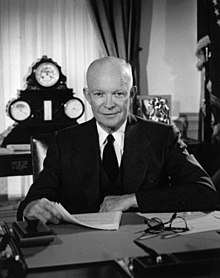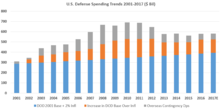军事工业复合体
军事工业复合体(英语:Military-Industrial Complex,MIC),也称军事工业国会复合体(Military-Industrial-Congressional Complex,MICC),中文简称军工复合体,描述了一个国家的军队与为其提供武器的国防工业之间的关系,两者共同被视为影响公共政策的既得利益[1][2][3][4]。它是工业复合体的一种。军方与具有防御意识的公司之间关系背后的一个驱动因素是双方都受益——一方获得战争武器,另一方获得提供这些武器的报酬[5]。 该术语最常用于指代美国武装部队背后的系统,由于国防承包商、五角大楼和政治家之间的密切联系,这种关系最为普遍[6][7]。 在1961年1月17日,第34任美国总统德怀特·戴维·艾森豪威尔的告别演说中警告这种关系的不利影响后,该表达方式变得流行起来[8][9]。
在美国语境下,这一称谓有时会延伸至军事-工业-国会复合体(MICC),加入美国国会形成三边关系,称为“铁三角”[10]。 它的三个支柱包括政治捐款、军费开支的政治批准、支持官僚机构的游说以及对行业的监督; 或更广泛地说,整个合同网络以及资金和资源在个人以及国防承包商、私人军事承包商、五角大楼、国会和行政分支部门的公司和机构之间的流动[11]。
词源
[编辑]
此名词由即将卸任美国总统的德怀特·戴维·艾森豪威尔在1961年1月17日发表的艾森豪威尔总统告别演说中首创[8]。指一国军队与军事工业因政治经济利益过于紧密而成的共生关系,这关系被视为影响公共政策及人民最大利益。[12][13][14][15][4]该术语现已成为一个贬义词,并且最常用于形容美国政客及国防承包商的密切联系。[16][7]军队过分仰赖私营军火企业提供军需,私人国防工业会以政治及经济手段,比如游说国会议员,指支持军工企业发展可为地方带来大量就业机会,确保政府会投入大量资金,甚至为推销武器而鼓动政府高层发动战争,令该国的军事开支巨大[5]。
这共生关系由国防承包商(军事工业)、五角大厦(军队)以及美国政府(立法部门及行政部门)的要角所构成的联合垄断;此联合垄断关系为发“战争财”来获取暴利,因而常与公众利益相违背,发动或促进不需要(甚至有危害)的战争或军事行动,在国际关系上可能引发不必要的军备竞赛及武器扩散。军事工业复合体的贬义,主要来自于这种联合垄断的政经关系不受民主程序的监督、反省及控制。[17]

在后来的艾森豪威尔演讲草稿中成为“军事”之前,这个短语被认为是“基于战争的”工业复合体,这一说法仅通过口述历史传播[18]。 杰弗里·佩雷特 (Geoffrey Perret) 在他的艾森豪威尔传记中声称,在一份演讲草稿中,该短语是“军事-工业-国会复合体”,表明美国国会在传播军事工业方面发挥着重要作用,但 最终版本中删除了“国会”一词,以安抚当时当选的官员[19]。 James Ledbetter 称这是一种“顽固的误解”,没有任何证据支持; 同样,道格拉斯·布林克利 (Douglas Brinkley) 声称它最初是“军事-工业-科学复合体”[19][20]。 此外,亨利·吉鲁声称它最初是“军事-工业-学术复合体”[21]。 演讲的实际作者是艾森豪威尔的演讲稿撰写人拉尔夫·E·威廉斯和马尔科姆·穆斯[22]。

在艾森豪威尔发表演讲之前,就已经有人尝试将类似于现代“军工复合体”的东西概念化。 Ledbetter 在 Winfield W. Riefler 发表于《外交事务》的一篇文章中发现 1947 年使用的确切术语与其后来的含义非常接近[19][24]。 1956 年,社会学家 赖特·米尔斯在他的《权力菁英》一书中声称,受共同利益驱动的一类军事、商业和政治领导人是国家的真正领导人,实际上不受民主控制。弗里德里希·哈耶克在他 1944 年的著作《通往奴役之路》中提到二战政治残余支持工业垄断组织的危险:
在这场战争之后可能会加强这一趋势的另一个因素是一些在战争期间尝过强制控制权力的人,他们会发现很难接受他们[在和平年代]将不得不扮演的更卑微的角色 [25]。
越南战争时期的活动家,如西摩·梅尔曼,经常提到这个概念,并在整个冷战期间继续使用:乔治·F·凯南在诺曼·考辛斯 1987 年出版的《权力的病理学》(The Pathology of Power) 一书的序言中写道,“如果苏联明天沉没在海洋水域下,美国军工复合体将不得不保持基本不变,直到可以发明其他对手。任何其他事情都会对美国经济造成不可接受的冲击。”[26]

冷战后
[编辑]
冷战结束时,美国国防承包商为他们所说的政府武器支出下降而哀叹[27][28]。 他们将紧张局势升级(例如与俄罗斯在乌克兰问题上的关系)视为增加武器销售的新机会,并直接或通过国防工业协会等行业团体推动政治体系在军事硬件上投入更多资金。 鉴于俄罗斯的威胁,由五角大楼承包商资助的美国智库,如列克星敦研究所和大西洋理事会,也要求增加支出[28][29]。 国际政策中心武器与安全项目主任 William Huntzberger 等独立的西方观察家指出,“俄罗斯的武力威胁对武器制造商有额外的好处,因为它已成为五角大楼增加支出论点的标准部分—— 即使五角大楼已经有足够的资金来解决对美国的任何实际威胁。”[28][30]
相关条目
[编辑]- 文学与媒体
- 《战争是一场骗局》(英语:War Is a Racket)- 斯梅德利·巴特勒 (Smedley Butler)少将 1935 年出版的书。
- 《权力菁英》(英语:The Power Elite)- 是美国社会学家赖特·米尔斯 1956年出版的著作。
参考来源
[编辑]- ^ military industrial complex. American Heritage Dictionary. Houghton Mifflin Harcourt. 2015 [3 March 2016]. (原始内容存档于March 6, 2016).
- ^ definition of military-industrial complex (American English). OxfordDictionaries.com. [3 March 2016]. (原始内容存档于March 7, 2016).
- ^ Definition of Military–industrial complex. Merriam-Webster. [3 March 2016]. (原始内容存档于2017-05-12).
- ^ 4.0 4.1 Roland, Alex. The Military-Industrial Complex: lobby and trope. Bacevich, Andrew J. (编). The Long War: A New History of U.S. National Security Policy Since World War II. Columbia University Press. 2009: 335–370. ISBN 978-0231131599.
- ^ 5.0 5.1 What is the Military-Industrial Complex?. [2017-02-05]. (原始内容存档于2021-01-08).
- ^ Ike's Warning Of Military Expansion, 50 Years Later. NPR. 17 January 2011 [27 March 2019]. (原始内容存档于2020-03-29).
- ^ 7.0 7.1 "SIPRI Year Book 2008; Armaments, Disarmaments and International Security" Oxford University Press 2008 ISBN 978-0199548958
- ^ 8.0 8.1 "The Military–Industrial Complex; The Farewell Address of Presidente Eisenhower" Basements publications 2006 ISBN 0976642395
- ^ Held, David; McGrew, Anthony G.; Goldblatt, David. The expanding reach of organized violence. Perraton, Jonathan (编). Global Transformations: Politics, Economics and Culture. Stanford University Press. 1999: 108. ISBN 978-0804736275.
- ^ Higgs, Robert. Depression, War, and Cold War : Studies in Political Economy: Studies in Political Economy
 . Oxford University Press. 2006: ix, 138 [3 March 2016]. ISBN 978-0195346084.
. Oxford University Press. 2006: ix, 138 [3 March 2016]. ISBN 978-0195346084.
- ^ Long-term Historical Reflection on the Rise of Military-Industrial, Managerial Statism or "Military-Industrial Complexes". Kimball Files. University of Oregon. [21 June 2014]. (原始内容存档于2019-03-28).
- ^ MILITARY-INDUSTRIAL COMPLEX English Definition and Meaning | Lexico.com. Lexico Dictionaries | English. [2022-02-26]. (原始内容存档于2021-12-14) (英语).
- ^ military industrial complex. American Heritage Dictionary. Houghton Mifflin Harcourt. 2015 [3 March 2016]. (原始内容存档于March 6, 2016).
- ^ definition of military-industrial complex (American English). OxfordDictionaries.com. [3 March 2016]. (原始内容存档于March 7, 2016).
- ^ Definition of Military–industrial complex. Merriam-Webster. [3 March 2016]. (原始内容存档于2017-05-12).
- ^ Ike's Warning Of Military Expansion, 50 Years Later. NPR. 17 January 2011 [27 March 2019]. (原始内容存档于2020-03-29).
- ^ Bacevich, Andrew J. The Long War: A New History of U.S. National Security Policy Since World War II. Columbia University Press. 2009-06-22 [2022-02-26]. ISBN 978-0-231-13159-9. (原始内容存档于2022-04-15) (英语).
- ^ John Milburn. Papers shed light on Eisenhower's farewell address. Associated Press. December 10, 2010 [January 28, 2011]. (原始内容存档于2012-03-17).
- ^ 19.0 19.1 19.2 Ledbetter, James. Guest Post: 50 Years of the "Military–Industrial Complex". Schott's Vocab. New York Times. 25 January 2011 [25 January 2011]. (原始内容存档于2018-06-28).
- ^ Brinkley, Douglas. Eisenhower; His farewell speech as President inaugurated the spirit of the 1960s. American Heritage. September 2001, 52 (6) [25 January 2011]. (原始内容存档于23 March 2006).
- ^ Giroux, Henry. The University in Chains: Confronting the Military–Industrial–Academic Complex. Paradigm Publishers. June 2007 [16 May 2011]. (原始内容存档于20 August 2007).
- ^ Griffin, Charles "New Light on Eisenhower's Farewell Address," in Presidential Studies Quarterly 22 (Summer 1992): 469–479
- ^ Top 100 | Defense News, News about defense programs, business, and technology.
- ^ Riefler, Winfield W. Our Economic Contribution to Victory. Foreign Affairs. October 1947, 26 (1): 90–103. JSTOR 20030091. doi:10.2307/20030091.
- ^ Hayek, F. A., (1976) "The Road to Serfdom", London: Routledge, p. 146, note 1
- ^ Kennan, George Frost. At a Century's Ending: Reflections 1982–1995. W.W. Norton and Company. 1997: 118. ISBN 978-0393316094.
- ^ Thompson Reuters Streetevents, 8 December 2015, "L-3 Communications Holding Inc. Investors Conference," p. 3, http://www.l-3com.com/sites/default/files/pdf/investor-pdf/2015_investor_conference_transcript.pdf 互联网档案馆的存档,存档日期April 19, 2016,.
- ^ 28.0 28.1 28.2 The Intercept, 19 August 2016, "U.S. Defense Contractors Tell Investors Russian threat is Great for Business," https://theintercept.com/2016/08/19/nato-weapons-industry/ (页面存档备份,存于互联网档案馆)
- ^ U.S. House of Representatives Committee on Armed Services, Subcommittee on Oversight and Investigations, 11 May 2016, Testimony of M. Thomas Davis, Senior Fellow, National Defense Industrial Association, "U.S. Industry Perspective on the Department of Defense's Policies, Roles and Responsibilities for Foreign Military Sales," http://docs.house.gov/meetings/AS/AS06/20160511/104900/HHRG-114-AS06-Bio-DavisT-20160511.pdf (页面存档备份,存于互联网档案馆)
- ^ Shindler, Michael. The Military Industrial Complex's Assault on Liberty. The American Conservative. June 22, 2018 [26 June 2018]. (原始内容存档于2021-11-10).
外部链接
[编辑]- Khaki capitalism (页面存档备份,存于互联网档案馆), The Economist, December 3, 2011
- Militaryindustrialcomplex.com (页面存档备份,存于互联网档案馆), Features running daily, weekly and monthly defense spending totals plus Contract Archives section.
- C. Wright Mills, Structure of Power in American Society, British Journal of Sociology, Vol. 9. No. 1 1958 (页面存档备份,存于互联网档案馆)
- Dwight David Eisenhower, Farewell Address (页面存档备份,存于互联网档案馆) On the military–industrial complex and the government–universities collusion – January 17, 1961
- Dwight D. Eisenhower, Farewell Address (页面存档备份,存于互联网档案馆) As delivered transcript and complete audio from AmericanRhetoric.com
- William McGaffin and Erwin Knoll, The military–industrial complex (页面存档备份,存于互联网档案馆), An analysis of the phenomenon written in 1969
- The Cost of War & Today's Military Industrial Complex (页面存档备份,存于互联网档案馆), National Public Radio, January 8, 2003.
- Human Rights First; Private Security Contractors at War: Ending the Culture of Impunity (2008)
- Fifty Years After Eisenhower's Farewell Address, A Look at the Military–Industrial Complex (页面存档备份,存于互联网档案馆) – video report by Democracy Now!
- Online documents, Dwight D. Eisenhower Presidential Library (页面存档备份,存于互联网档案馆)
- 50th Anniversary of Eisenhower's Farewell Address (页面存档备份,存于互联网档案馆) – Eisenhower Institute
- Part 1 – Anniversary Discussion of Eisenhower's Farewell Address (页面存档备份,存于互联网档案馆) – Gettysburg College
- Part 2 – Anniversary Discussion of Eisenhower's Farewell Address (页面存档备份,存于互联网档案馆) – Gettysburg College
